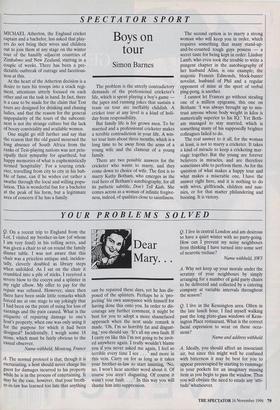SPECTATOR SPORT
Boys on tour
Simon Barnes
MICHAEL Atherton, the England cricket captain and a bachelor, has asked that play- ers do not bring their wives and children out to join them at any stage on the winter tour of the handily adjacent countries of Zimbabwe and New Zealand, starting in a couple of weeks. There has been a pre- dictable outbreak of outrage and facetious- ness at this.
At the heart of the Atherton decision is a desire to turn his troops into a crack regi- ment, attentions utterly focused on each other and on the task in hand. In fact, there is a case to be made for the claim that Test tours are designed for drinking and chasing ladies, and that the reason for the general unpopularity of the tours of the subconti- nent is not the strange culture but the lack of boozy conviviality and available women.
One might go still further and say that the reason that the old guard mourned the long absence of South Africa from the ranks of Test-playing nations was not prin- cipally their sympathy for apartheid, but happy memories of what is euphemistically termed `hospitality'. For a touring crick- eter, travelling from city to city in his bub- ble of fame, can if he wishes cut rather a swathe through the local and willing popu- lation. This is wonderful fun for a bachelor at the peak of his form, but a legitimate area of concern if he has a family. The problem is the utterly contradictory demands of the professional cricketer's life, which is spent playing a boy's game the japes and running jokes that sustain a team on tour are ineffably childish. A cricket tour at any level is a kind of holi- day from responsibility.
But family life is for grown men. To be married and a professional cricketer makes a terrible contradiction in your life. A win- ter tour lasts about three months, which is a long time to be away from the arms of a young wife and the clamour of a young family.
There are two possible answers for the cricketer who wants to marry, and they come down to choice of wife. The first is to marry Kathy Botham, who emerges as the real hero of Botham's autobiography, for all its pathetic subtitle, Don't Tell Kath. She comes across as a woman of infinite forgive- ness, indeed, of qualities close to saintliness. The second option is to marry a strong woman who will keep you in order, which requires something that many stand-up- and-be-counted tough guys possess — a secret taste for being kept in order. Lindsay Lamb, who even took the trouble to write a pungent chapter in the autobiography of her husband Allan, is one example; the majestic Frances Edmonds, block-buster novelist, husband of Phil and a regular opponent of mine at the sport of verbal ping-pong, is another.
I cannot let Frances go without stealing one of a million epigrams, this one on Botham: `I was always brought up to mis- trust anyone whose body weight in kilos is numerically superior to his IQ.' Yet Both- am managed to stay married, which is something many of his supposedly brighter colleagues failed to do.
The real answer to it all, for the woman at least, is not to marry a cricketer. It takes a kind of miracle to keep a cricketing mar- riage together. But the young are forever believers in miracles, and are therefore sometimes able to perform them. As for the question of what makes a happy tour and what makes a miserable one, I have the answer right here, and it is nothing to do with wives, girlfriends, children and nan- nies, or for that matter philandering and boozing. It is victory.


















































































 Previous page
Previous page